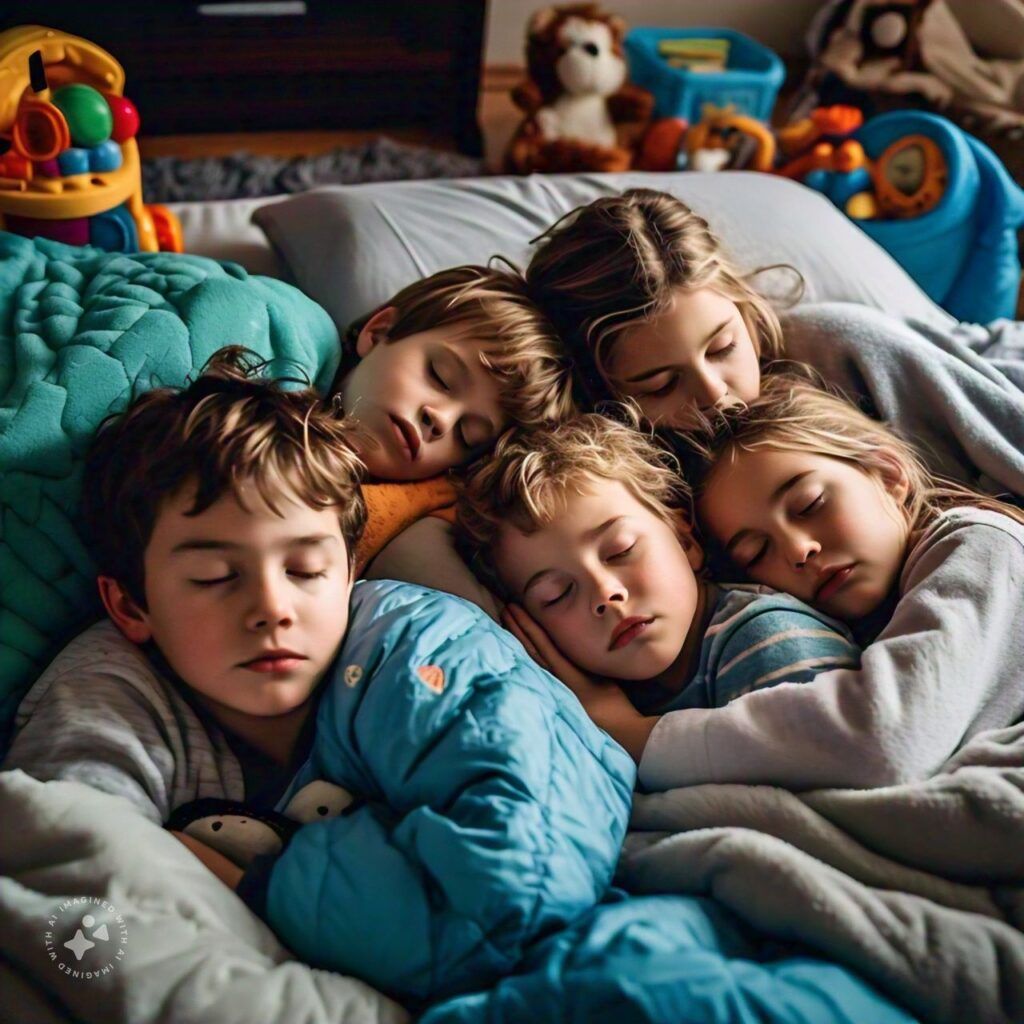Remember those nights of popcorn fights, ghost stories, and staying up way past bedtime? Sleepovers might be a childhood rite of passage, but as a parent, they can feel more like a rite of worry. Sleepovers can be a mix of excitement and anxiety, but are they worth it?
Sleepovers can be a thrilling adventure for kids, filled with laughter, late-night snacks, and secret-sharing. But for parents, they can be a source of anxiety and sleepless nights.
While the idea of a sleepover conjures up images of pillow fights and popcorn, there are underlying concerns that every parent should consider.
In this post, we’ll explore 7 reasons to say no to sleepovers and why that might be the best decision for your child’s well-being. Buckle up, because it’s time to uncover the not-so-sleepy side of sleepovers.
Why Sleepovers?
It is the quintessential childhood adventure where popcorn and pillow fights reign supreme. Kids love them for the endless giggles and midnight snacks, while parents often find themselves caught between nostalgia and nerves.
Why do sleepovers hold such universal appeal? Is it the promise of staying up way past bedtime, or the thrill of whispered secrets shared under a makeshift blanket fort?
Why Parents Are Concerned
Yet, behind the laughter and late-night movies, there’s a host of concerns that can make any parent hesitate. What if my child doesn’t get enough sleep? Who’s watching them? What if they’re exposed to things I’d rather they not see?
These are just a few of the questions that might keep you up at night while your little one is supposedly having the time of their life. Did you know that a survey found nearly 60% of parents worry about their child’s safety at sleepovers?
And it’s not just about safety; there are concerns about hygiene, peer pressure, and even the occasional bout of homesickness that can turn a fun night into a teary phone call home. So, should you hit the brakes on sleepovers?
Reasons To Say No To Sleepovers
To answer the question of whether you should hit the brakes on sleepovers or not. Here are 20 reasons you could give to say no to sleepovers.
1. Safety Concerns
When it comes to sleepovers, one of the biggest concerns for parents is safety. It’s natural to worry about the environment your child will be in. After all, no one knows your child’s needs and quirks better than you do. Sending them off to someone else’s home can feel like stepping into the unknown.
It’s not about being overprotective; it’s about being practical. And it’s not just about the immediate safety concerns, what if there’s an emergency? Do the hosts have a plan? Do they know about your child’s allergies or medical needs?
So, while sleepovers can be a blast, it’s essential to weigh these safety considerations. Knowing the environment your child is in and being confident about the supervision they’ll receive can make all the difference between a night of fun and a night of worry.
Sometimes, saying ‘no’ to a sleepover is the safest choice for your peace of mind and your child’s well-being.
2. Exposure to Inappropriate Content
Sleepovers can be a whirlwind of movies, games, and online fun. But what happens when the content isn’t exactly kid-friendly? There’s always the possibility that your child might be exposed to unsuitable movies, games, or online content that you wouldn’t normally allow at home.
The influence of media is powerful. Children are impressionable, and exposure to inappropriate content can have a significant impact on their behaviour and mindset. From nightmares to mimicking risky behaviour, the effects can be more than just temporary.
So, while sleepovers promise fun, they also come with the risk of your child encountering content you’d rather they avoided. Being cautious about this exposure is another valid reason to consider saying ‘no’ to sleepovers. Your child’s mental and emotional well-being is worth it.
3. Behavioural Issues
Sleepovers can be a social challenge. Group dynamics often change, leading to bullying or exclusion. You just can’t imagine your child feeling left out or being the target of hurtful jokes because it’s a tough scenario to behold.
In group settings, children can behave differently than they do one-on-one. The desire to fit in or stand out can lead to uncharacteristic and sometimes negative behaviours, resulting in hurt feelings.
The emotional impact of being excluded or bullied at a sleepover can be significant. Kids might return home feeling sad, anxious, or with lowered self-esteem. Naturally, as a parent, you want to shield your child from such negative experiences.
Considering these potential behavioural issues is another compelling reason to say ‘no’ to sleepovers. Your child’s emotional well-being is always a priority.
4. Allergies
Allergies can be a major concern during sleepovers. If your child has a severe allergy to pets or certain foods, staying in a different home can be risky. Your child could be around a cat or exposed to peanuts and could face serious health issues.
Even the most well-intentioned host might not fully understand the severity of your child’s allergies or how to manage them. This can lead to accidental exposure and potential medical emergencies.
Managing severe allergies outside your own home is tough. Cross-contamination in kitchens, hidden ingredients in snacks, or simply being near a pet can trigger an allergic reaction.
These allergy risks are another important reason to consider saying ‘no’ to sleepovers. Ensuring your child’s health and safety should always come first.
5. Inadequate Supervision
Inadequate supervision is a major concern with sleepovers. Without proper adult oversight, kids can easily find themselves in risky or unsafe situations.
Just imagine a group of excited children, high on sugar and the thrill of being away from home, left without close supervision. They might sneak out, play dangerous games, or access inappropriate content online. The absence of vigilant adults can quickly lead to trouble.
Without proper monitoring, the likelihood of accidents or mischief increases. Kids may take risks they wouldn’t normally consider simply because there’s no one around to enforce boundaries.
Inadequate supervision is another important reason to consider saying ‘no’ to sleepovers. Ensuring your child is in a well-supervised environment is crucial for their safety and your peace of mind.
6. Stranger Danger
When it comes to sleepovers, the idea of stranger danger can get any parent’s protective instincts kicking in. It’s natural to worry about your child being in a home where unfamiliar faces might be present.
You want to ensure your child feels safe and comfortable, but how can you be sure they’re protected from strangers? It’s a tough call, especially when your child might be excited about the sleepover not thinking about potential risks.
Knowing who’s in the hosting home and ensuring they’re trustworthy adults is essential. It’s not just about knowing the parents but feeling confident that your child is in a secure environment where strangers won’t pose a threat.
Stranger danger is another important reason to consider saying ‘no’ to sleepovers. Ensuring your child is in a safe environment free of strangers is crucial for their safety and your peace of mind.
7. Peer Pressure
Sleepovers are a time for bonding and creating memories, but they can also present opportunities for risky behaviours. They could try something they wouldn’t do at home or go along with the group to fit in, peer pressure can influence kids in unexpected ways.
As a parent, it’s natural to worry about these situations. You want your child to have fun, but you also want them to make safe choices and stay true to themselves.
Being aware of potential peer pressure scenarios and discussing them with your child beforehand can help prepare them to get through these moments.
By understanding the dynamics of peer pressure at sleepovers, you can make informed decisions about whether to say ‘yes’ or ‘no’ to these social gatherings. This could be a reason to say ‘no’ to sleepovers.

You Should Note That…
While sleepovers offer opportunities for fun and friendship-building, they also come with inherent risks. It’s crucial to weigh these factors carefully and prioritize your child’s well-being above all else.
Remember, every family is unique, and what works for one may not work for another. Whether you decide to embrace sleepovers or opt for alternative social activities, trust your instincts as a parent.
Your decision should reflect what you feel is best for your child and align with your family’s values and comfort level. Choose wisely, stay informed, and may your family’s sleepover adventures be filled with laughter and cherished memories.


